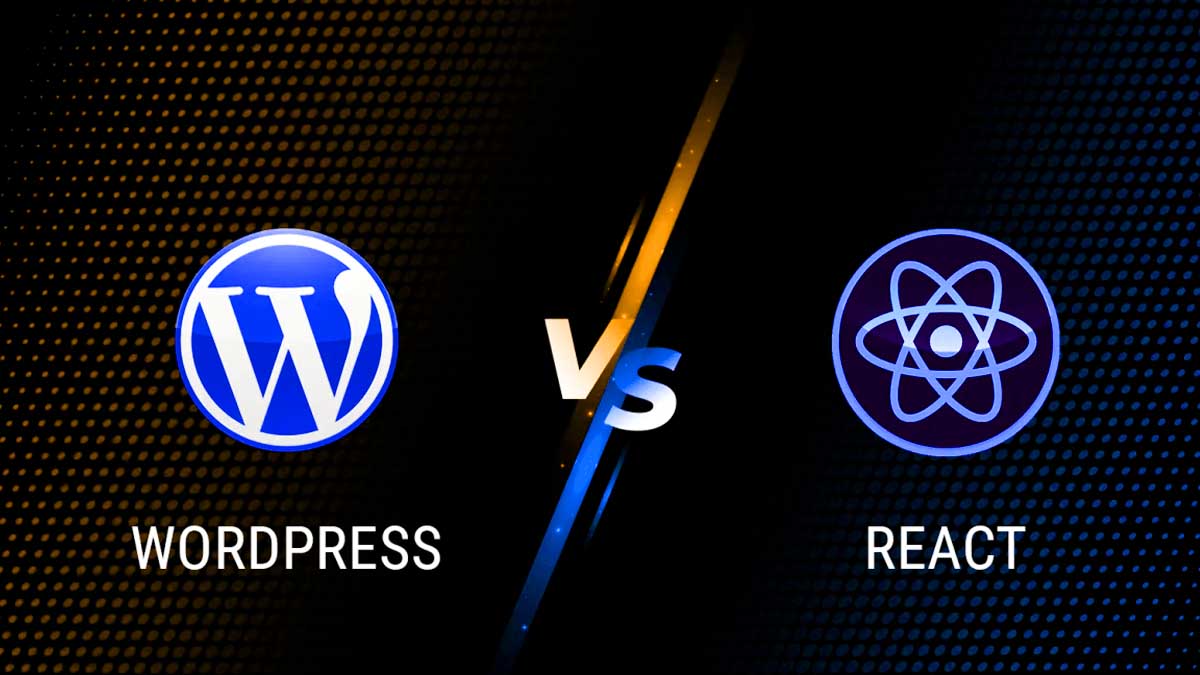In the dynamic landscape of website development, choosing the right platform is paramount to the success of your online presence. WordPress Vs React are two popular choices, each offering unique advantages and functionalities. In this comprehensive guide, we delve into the intricacies of both platforms to help you make an informed decision.
Understanding WordPress
WordPress stands as a stalwart in the realm of content management systems (CMS). Renowned for its user-friendly interface and extensive plugin ecosystem, WordPress powers millions of websites across the globe.
Key Features of WordPress
- Ease of Use: WordPress boasts an intuitive dashboard, making it accessible to beginners and experienced users alike.
- Customization: With thousands of themes and plugins, WordPress allows for extensive customization to suit your specific needs.
- SEO-Friendly: Built-in SEO features and plugins facilitate optimization, enhancing your website’s visibility on search engines.
- Community Support: The vast WordPress community offers abundant resources, including forums, tutorials, and documentation.
Use Cases
WordPress is ideal for a wide range of websites, including:
- Blogs: Its origins as a blogging platform make WordPress a natural choice for bloggers seeking a versatile and robust platform.
- Business Websites: From small businesses to large enterprises, WordPress accommodates various business needs, offering scalability and flexibility.
- E-commerce: With plugins like WooCommerce, WordPress powers numerous online stores, providing robust e-commerce solutions.
Exploring React
React, developed by Facebook, has emerged as a leading JavaScript library for building user interfaces. Its component-based architecture and virtual DOM offer unparalleled performance and flexibility.
Key Features
- Component Reusability: React’s modular approach allows for the creation of reusable components, streamlining development and maintenance.
- Virtual DOM: By leveraging a virtual representation of the DOM, React minimizes unnecessary re-rendering, optimizing performance.
- One-Way Data Binding: React’s unidirectional data flow simplifies state management, enhancing predictability and stability.
- Rich Ecosystem: React is supported by a vast ecosystem of libraries and tools, facilitating rapid development and innovation.
Use Cases
React excels in various scenarios, including:
- Single-Page Applications (SPAs): Its ability to create dynamic and interactive user interfaces makes React an ideal choice for SPAs.
- Complex Web Applications: React’s component-based architecture and state management capabilities make it well-suited for building complex web applications.
- Real-Time Updates: Applications requiring real-time data updates, such as social media platforms and collaboration tools, benefit from React’s efficiency.
WordPress vs. React: Making the Choice
Considerations
When deciding between WordPress and React, consider the following factors:
- Ease of Use: WordPress is renowned for its user-friendly interface, making it suitable for beginners. React, while powerful, may have a steeper learning curve.
- Scalability: WordPress offers scalability for a wide range of websites, while React’s performance makes it ideal for highly interactive applications.
- Development Time: WordPress’s extensive ecosystem allows for rapid development, whereas React’s component-based approach may require more initial setup but offers long-term benefits.
- Specific Requirements: Assess your project’s specific requirements, such as SEO needs, e-commerce functionality, and scalability, to determine the most suitable platform.
Frequently Asked Questions About wordpress vs react
1. Is WordPress suitable for building complex web applications?
WordPress is primarily designed for content-centric websites such as blogs, news sites, and e-commerce stores. While it can be extended to support more complex functionalities through plugins and custom development, it may not be the most efficient choice for highly dynamic and interactive web applications.
2. Can I use React with WordPress?
Yes, React can be integrated with WordPress to create modern, dynamic user interfaces. Developers can leverage the REST API provided by WordPress to fetch data and interact with the backend, while using React on the frontend to build interactive components and interfaces.
3. Which platform is better for SEO: WordPress Vs React?
Both WordPress and React offer features that can contribute to SEO success. WordPress comes with built-in SEO tools and plugins, making it easier to optimize content for search engines. On the other hand, React’s efficient rendering and performance can indirectly impact SEO by improving user experience and site speed.
4. Does using React mean sacrificing SEO-friendliness?
Not necessarily. While React is primarily a frontend library focused on user interface development, it can be used to build SEO-friendly web applications when combined with server-side rendering (SSR) techniques or pre-rendering solutions. Additionally, optimizing content and metadata can further enhance the SEO performance of React-based websites.
5. What are the security implications of using WordPress vs React?
WordPress, being a widely-used platform, is often targeted by hackers and malicious actors. Regular updates and security measures are essential to safeguard WordPress websites against vulnerabilities. React, on the other hand, is a frontend library and does not pose inherent security risks. However, developers must still adhere to best practices and follow security guidelines to protect React applications from potential threats.
6. Which platform offers better performance: WordPress or React?
Performance largely depends on the specific requirements of the project. WordPress excels in handling content-centric websites with moderate traffic, while React shines in building highly interactive and performance-critical applications. Choosing the right platform involves considering factors such as scalability, user experience, and development complexity.
Final Wording
In the battle of WordPress vs React, there is no clear winner. Each platform brings its own set of strengths and weaknesses to the table, catering to different needs and preferences. Whether you prioritize ease of use, customization options, performance, or scalability, it’s essential to weigh the pros and cons carefully before making a decision. By understanding the nuances of both WordPress vs React, you can embark on your web development journey with confidence, knowing that you’ve chosen the platform that best aligns with your project goals and requirements.
